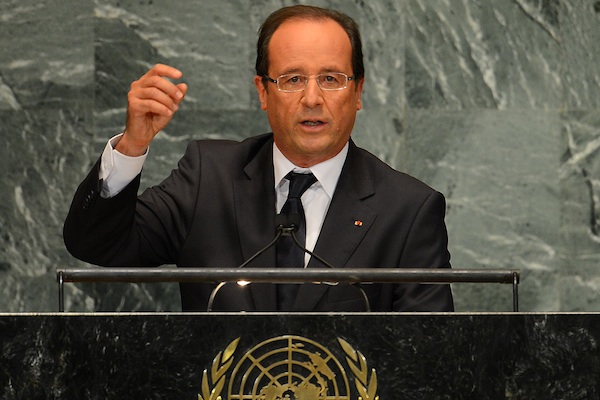François Hollande is nothing if not a traditionalist. French governments of the left usually come to office promising to reject austerity and pursue a holy grail of growth, only to hit the buffers of economic reality on election. In 1936, the Popular Front sought to overturn the orthodoxy of its predecessors after the Great Slump and in 1981 François Mitterrand pledged to escape from Giscard d’Estaing’s rigorous policies in reaction to the first oil shock. After being appointed as the country’s latest finance minister this summer, Pierre Moscovici duly declared that ‘austerity’ was a word he did not like. But austerity is, nonetheless, what the new president has been forced into, though what exactly it will mean remains open to some questions with major importance for France in the coming years.
This week, the French government delivered what it called the most austere budget in 30 years. Hollande is seeking to meet targets David Cameron would find quite unwork-able: reducing government overspend to 3 per cent of economic output by next year. This is not what his supporters had in mind when he said ‘the change is now’.
The president began to talk about cutting state spending during the election campaign, though the spin in his speeches was on expansion rather than belt-tightening. Now, reducing expenditure is at the core of the budget, but is balanced politically by promises to raise taxes on the rich. The message is that the wealthy must share in austerity — a 75 per cent marginal rate enables them to do their patriotic duty in hard times.

But taxing the plutocracy — a pet policy of a man who says he does not like rich people — will not be enough. Some of France’s largest taxpayers, like Bernard Arnault, have already decided to emigrate. With the economy flatlining, big cuts in public spending look inevitable. That will bring the administration into conflict with its supporters on the left, including the militant communist-led CGT union federation. And even this may not be enough to assuage the markets.
Ed Miliband, who so publicly aligned himself with Hollande, will be watching in horror as his comrade crashes in the opinion polls: his approval rating went from 54 per cent in August to 43 per cent last weekend. Other European left-wing leaders who hoped that Hollande had come up with a magic potion for the crisis are in for an equal disappointment. Mitterrand said in 1981 that there was nothing wrong with dreaming; but there is, come wake-up time.
As France’s first socialist president for 17 years, Hollande likes to put himself forward as a realist, a ‘normal’ head of state free from the over-ebullience of his predecessor, Nicholas Sarkozy, and from Gaullist grandiloquence. His rejection of the politics of austerity during his election campaign seemed to socialist leaders elsewhere in Europe to offer an escape from the confines imposed by Berlin, Frankfurt and Brussels. But last Friday, his administration’s first budget was a moment of truth, showing the impossibility of squaring the circle between election promises and the grim economic situation of a country whose national character requires it to be in the European vanguard.
It was dislike for Sarkozy that won ‘Monsieur Normal’ the election
If that is not enough to demonstrate the flaws in Hollande’s cheery election message, the president’s woes are piling up on all sides. His election as the second choice of his party after Dominique Strauss-Kahn’s disgrace in New York was made possible by the unpopularity of his opponent. Dislike for Sarkozy got ‘Monsieur Normal’ to the Elysée Palace in May. Four months on, he induces widespread apathy or disbelief, the sense that he is a man who wishes well but is not up to the job’s status: what was he doing chairing a meeting about the labour dispute at the Peugeot car company when it should have been handled by a minister?
Hollande is caught not only by his promises but by his party. He is the first president of the Fifth Republic who has not formed or reformed a political movement in his image; he was its standard-bearer in the election but is a party servant rather than a chieftain. Big socialist beasts prowl on the sidelines, such as Martine Aubry, the former Labour minister who introduced the 35-hour working week and declined to join the government.
The ministerial line-up is not one to inspire the nation. The prime minister, Jean-Marc Ayrault, whose poll ratings have also slumped, is earnest but lacklustre. Moscovici carries little weight. Laurent Fabius, the foreign minister, dates back to the nationalisation binge of the early Mitterrand era and led the ‘no’ campaign in the 2005 referendum on the European Constitution. The one exception is the interior minister, Manuel Valls, but his plain-speaking style earns him disapproval from the left. The Greens, junior partners on the ruling coalition, did not make matters any easier for the president by deciding to vote against the EU Stability Treaty.
The ‘bling’ style may have gone out with Sarkozy, but Hollande’s private life is fodder for gossip magazines and provokes ribaldry as his present mistress wages war on his former partner, the 2007 socialist candidate, Ségolène Royal, who retains a devoted flock of followers but is an anathema to the socialist establishment.
Most seriously, Germany looms. At Angela Merkel’s urging, Sarkozy had accepted that France needed to be ‘more German’ in its economic approach. Hollande’s rejection of austerity did not play well across the Rhine. Relations between him and the Chancellor are cool; Aryaud’s call last week for Greece to be given more time to put its house in order is not what Berlin wants to hear.
Germans have noticed the rise of hostile sentiment towards them in France, not just from the hard left but also from the industrial recovery minister, Arnaud Montebourg, who got almost 20 per cent support in the socialist presidential primary — and, of course, from Marine Le Pen, whose National Front would damn the EU project and steer France to defiant national sovereignty.
The Gaullist equation under which Germany supplied the economic muscle and left political leadership to its neighbour has broken down. Berlin will not defer to Paris. That creates an existential problem for France. But Hollande will have to reckon with second-class status so long as his country’s economy splutters along with overblown labour costs, excessive taxation, high unemployment and regulations that deter job creation.
The dream of breaking free from the restrictions incurred as a result of years of spending beyond the national means — the budget has not been balanced since 1974 — never looked convincing. But, for all the talk of austerity, the pressures for a weak president to put off the day of reckoning are strong. So how this budget is implemented will be Hollande’s first major test. If he chooses a fudge, there can only be more pain down the road.





Comments